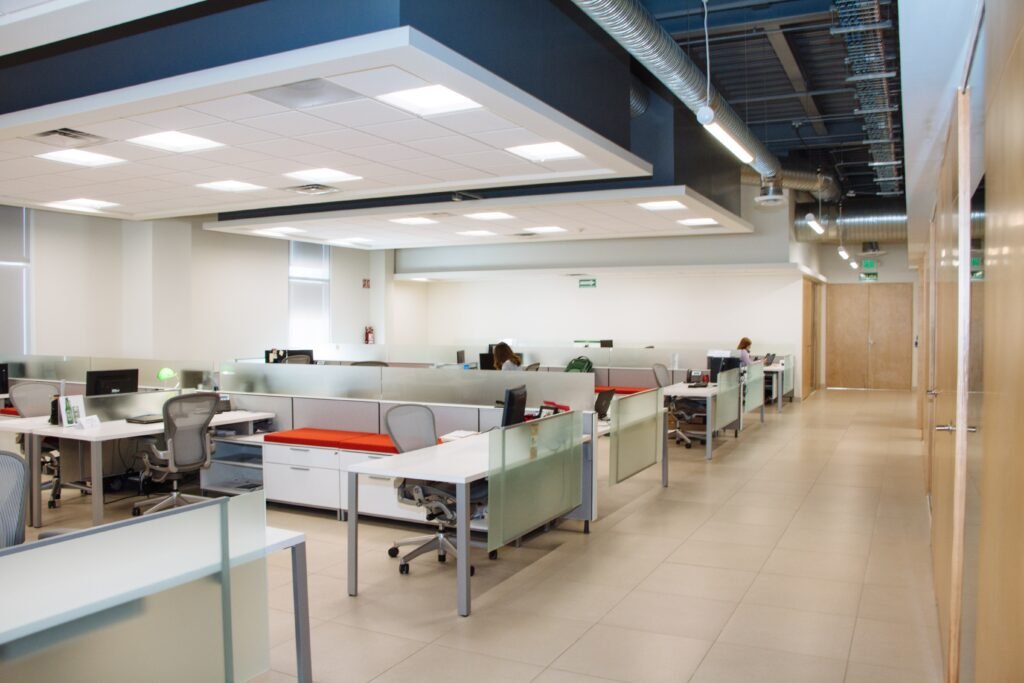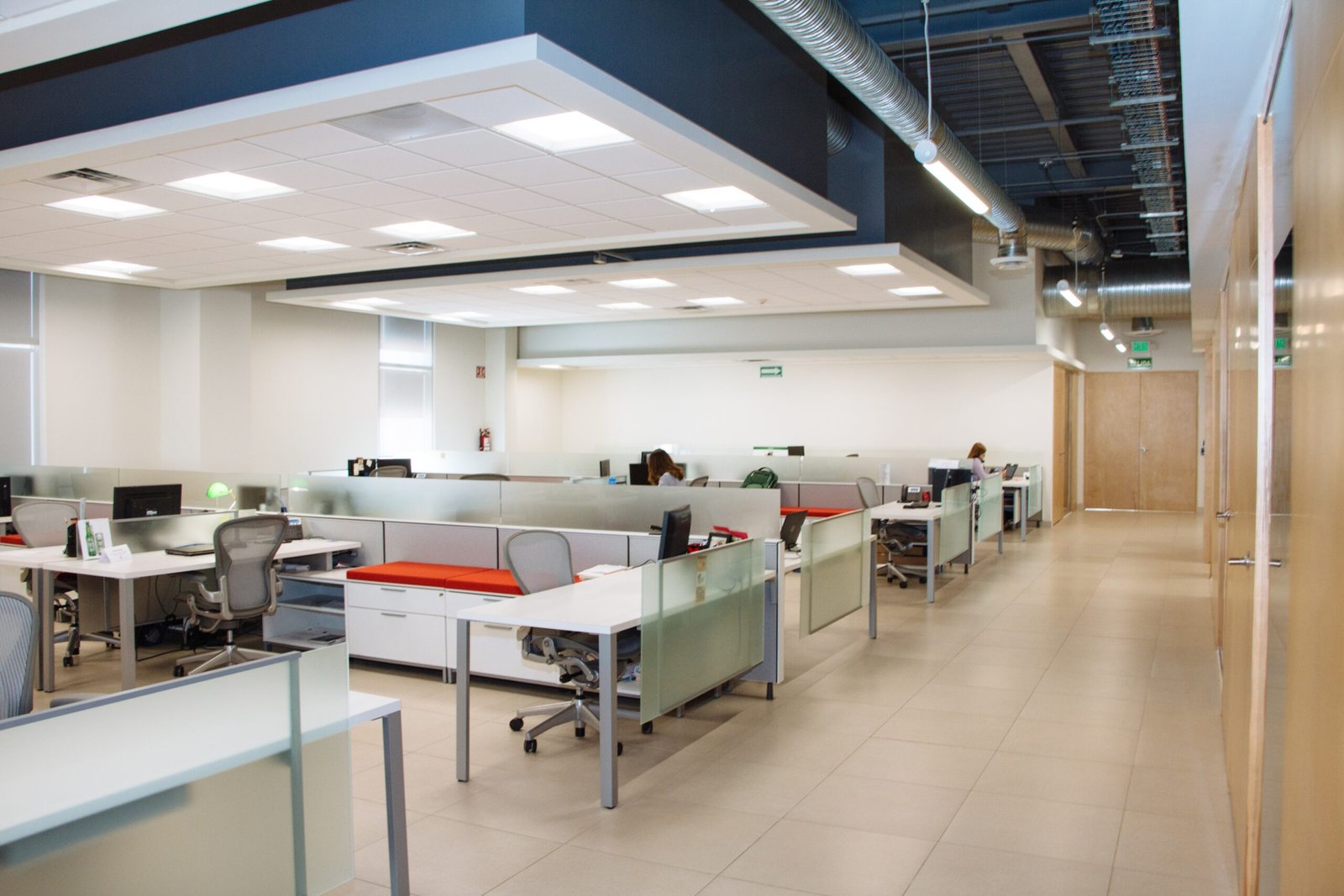In recent years, there has been a noticeable surge in the popularity of co-working spaces across South African cities. These shared office spaces have become a hub for entrepreneurs, freelancers, and small businesses alike, offering flexibility, affordability, and a collaborative environment. With the rise of remote work and the increasing demand for flexible working options, co-working spaces have emerged as a solution that caters to the needs of the modern workforce. This article explores the growing trend of co-working spaces in South Africa and the benefits they bring to professionals seeking a productive and vibrant working environment.

Understanding the Concept of Co-Working Spaces
Definition of co-working spaces
Co-working spaces are shared work environments where individuals from different companies or professions work side by side. They provide a flexible and collaborative working environment, offering amenities such as workstations, meeting rooms, and communal areas. Co-working spaces are designed to foster community and networking opportunities among professionals.
The philosophy behind co-working spaces
Co-working spaces are built on the foundation of collaboration, creativity, and community. The philosophy behind these spaces is to create an inclusive and supportive environment where individuals can work independently while also benefiting from the presence of like-minded professionals. The aim is to foster innovation, productivity, and social connections, ultimately promoting personal and professional growth.
The Emergence of Co-Working Spaces in South Africa
Historical overview
The concept of co-working spaces emerged in the late 1990s, evolving as a response to the changing nature of work and the rise of the gig economy. However, it was not until the early 2000s that co-working spaces gained significant traction globally.
The first co-working spaces in South Africa
In South Africa, the first co-working spaces began to appear around the early 2010s. The rise of these spaces can be attributed to the growing demand for flexible workspaces and the increasing number of freelancers, entrepreneurs, and remote workers seeking alternatives to traditional offices.
Current trends
Currently, co-working spaces in South Africa have become an integral part of the business landscape. They offer a range of amenities and services tailored to the needs of modern professionals. Co-working spaces are not limited to major cities but are expanding to suburban areas and even smaller towns, catering to the diverse needs of professionals across the country.

Rapid Growth of Co-Working Spaces in South African Cities
Factors driving the growth
Several factors contribute to the rapid growth of co-working spaces in South African cities. Firstly, the rise of the gig economy and the increasing number of freelancers and remote workers seeking flexible work arrangements have created a demand for alternative workspaces. Additionally, high office rental costs and the need for cost-effective solutions have further fueled the growth of co-working spaces.
Most popular cities for co-working in South Africa
The most popular cities for co-working in South Africa include Johannesburg, Cape Town, and Durban. These cities are known for their vibrant business communities and entrepreneurial spirit, making them ideal locations for co-working spaces to thrive. They offer a variety of options, from trendy shared offices in the city center to more relaxed suburban spaces.
Predicted growth
The co-working industry in South Africa is expected to continue growing at a rapid pace. As more professionals embrace flexible working arrangements and businesses seek to optimize their real estate expenses, the demand for co-working spaces will only increase. This growth presents opportunities for innovation and diversification within the co-working sector.
Profiles of People Utilizing Co-Working Spaces
Demographic breakdown
Co-working spaces attract a diverse range of professionals across various age groups and industries. Young entrepreneurs and freelancers form a significant segment of co-working users, seeking the flexibility and networking opportunities these spaces offer. However, professionals from established businesses and organizations also utilize co-working spaces as satellite offices or for project-based work.
Occupational trends
A wide range of occupations can be found in co-working spaces in South Africa. From tech startups and creative agencies to independent consultants and professionals from traditional industries, co-working spaces accommodate a diverse group of occupations. This diversity fosters collaboration and cross-pollination of ideas, enhancing the overall productivity and creativity within the co-working community.
Benefits perceived by users
Users of co-working spaces often cite numerous benefits that they perceive from working in such environments. These include increased flexibility in terms of working hours and location, access to a professional community for networking and collaboration, and opportunities for personal and professional growth. Co-working spaces also provide a conducive environment for productive work, with amenities such as high-speed internet, well-designed workstations, and collaborative areas.

Impacts of COVID-19 on Co-Working Spaces
Initial impact of pandemic lockdowns
The COVID-19 pandemic had a significant impact on co-working spaces in South Africa. When the country went into lockdown, many co-working spaces had to temporarily close their doors, resulting in financial challenges for operators and the displacement of their users. This initial impact highlighted the vulnerability of co-working spaces to external disruptions.
Adapting to new working norms
In response to the pandemic, co-working spaces had to adapt to new working norms and prioritize health and safety measures. This included implementing strict hygiene protocols, reducing capacity, and reorganizing office layouts to ensure physical distancing. Many co-working spaces also introduced hybrid models, offering a combination of physical and virtual workspaces to meet the changing needs of their users.
Post-pandemic prospects for co-working spaces
Despite the challenges faced during the pandemic, co-working spaces are expected to rebound and play a vital role in the post-pandemic workplace. As businesses transition to more flexible and remote working models, co-working spaces can provide an ideal solution for professionals seeking a balance between working from home and accessing professional amenities and networking opportunities.
The Future of Work and Co-Working Spaces
Role of technology in co-working spaces
Technology will play a crucial role in shaping the future of co-working spaces. From advanced booking systems and smart office management tools to virtual collaboration platforms and digital networking channels, technology will enhance the efficiency and connectivity within co-working communities. This integration of technology will allow for seamless remote access to co-working spaces and foster collaboration between physically distant professionals.
Increasing demand for hybrid working models
Hybrid working models, combining remote work and office-based work, are expected to become increasingly popular in the future. Co-working spaces are well-positioned to cater to this demand, offering professionals the flexibility to choose when and where they work. This hybrid approach allows for a better work-life balance and can increase productivity and job satisfaction.
Influence of co-working spaces on corporate real estate
Co-working spaces have had a significant impact on the corporate real estate sector. As businesses adopt more flexible working arrangements, office spaces are being reimagined to accommodate the changing needs of employees. Companies are increasingly considering co-working partnerships or incorporating co-working elements into their own office designs to provide employees with a diverse and collaborative working environment.
Innovations in Co-Working Spaces
Evolution of co-working spaces
Co-working spaces continue to evolve, adapting to the needs of modern professionals. Beyond offering shared workstations and amenities, co-working spaces now feature diverse spaces catered to different working styles. These include private offices, dedicated desks, soundproof pods, and communal areas designed for relaxation and collaboration. The evolution of co-working spaces allows for more tailored experiences suited to individual preferences.
Unique designs and technology integration
Co-working spaces in South Africa are known for their unique designs and thoughtful integration of technology. Many spaces prioritize natural light, ergonomic furniture, and green spaces to create a conducive and aesthetically pleasing environment. Additionally, the integration of state-of-the-art technology, such as wireless chargers, high-speed internet, and smart meeting room systems, enhances productivity and facilitates seamless collaboration among users.
How South African co-working spaces stand out
South African co-working spaces stand out for their diverse range of offerings and their commitment to promoting local talent and entrepreneurship. Many spaces host events, workshops, and networking sessions to connect professionals and foster collaboration. Furthermore, co-working spaces in South Africa often prioritize sustainability and social impact, creating a sense of purpose and community among their users.
Social Impact of Co-Working Spaces
Contribution to local communities
Co-working spaces have a positive impact on local communities by fostering collaboration, supporting local businesses, and invigorating the economy. These spaces often partner with local entrepreneurs, artists, and service providers to offer unique experiences and products to their members. Co-working spaces also contribute to the rejuvenation of neglected areas, attracting professionals who bring energy and investment to previously overlooked neighborhoods.
Environmental consciousness in co-working spaces
Many co-working spaces in South Africa prioritize environmental sustainability and adopt eco-friendly practices. These spaces incorporate renewable energy sources, implement recycling programs, and promote conscious consumption. By doing so, co-working spaces contribute to reducing the carbon footprint of the businesses operating within them and inspire professionals to adopt more sustainable practices in their work and personal lives.
Supporting entrepreneurship and start-up culture
Co-working spaces play a crucial role in supporting entrepreneurship and nurturing start-up culture. They provide an affordable and supportive environment for aspiring entrepreneurs to launch and grow their businesses. Co-working spaces often offer mentorship programs, networking events, and access to investors, creating opportunities for collaboration and growth within the entrepreneurial ecosystem.
Challenges and Pitfalls of Co-Working Spaces
Financial risks and sustainability
Operating a co-working space involves financial risks, including high initial setup costs, fluctuating occupancy rates, and the need to constantly update and improve facilities. To ensure long-term sustainability, co-working space operators must navigate these challenges by carefully managing their finances, maintaining a diverse client base, and continuously innovating to meet the evolving needs of professionals.
Managing a diverse community
Co-working spaces bring together individuals from various backgrounds, industries, and personalities. Managing a diverse community requires attentive communication, conflict resolution skills, and a commitment to fostering a positive and inclusive environment. Co-working space operators must dedicate resources to community building and create clear guidelines to ensure the smooth integration and coexistence of their members.
Security and privacy concerns
With multiple individuals working in shared spaces, security and privacy concerns can arise. Co-working spaces need to implement access control measures, secure network infrastructure, and privacy policies to protect the data and personal information of their users. Providing private workstations, soundproof areas, and secure lockers can also address the concerns of professionals who prioritize confidentiality and data security.
Case Studies of Successful Co-Working Spaces in South Africa
Profiles of popular co-working spaces
- The Workspace
- WeWork
- Workshop 17
- Open, Cape Town
Factors contributing to their success
The success of these co-working spaces can be attributed to several factors. Their prime locations, well-designed and functional spaces, and a wide range of amenities attract professionals looking for convenient and productive work environments. Additionally, these spaces prioritize community building, organizing events, and fostering collaboration, creating a sense of belonging and engagement among their users.
Lessons to learn from these case studies
The case studies of successful co-working spaces in South Africa highlight the importance of understanding the needs of professionals, adapting to changing trends, and fostering a strong sense of community. Operators should focus on providing quality infrastructure, flexible membership options, and a supportive and inclusive atmosphere. Investments in technology, sustainability, and local partnerships can also contribute to the long-term success of co-working spaces.
In conclusion, the rise of co-working spaces in South African cities has transformed the traditional concept of work, offering professionals flexible and collaborative environments that promote productivity, networking, and personal growth. Co-working spaces have become integral to modern work culture, with the potential to shape the future of work and corporate real estate. Despite challenges and the impact of the COVID-19 pandemic, the co-working industry in South Africa continues to grow, providing opportunities for entrepreneurs, professionals, and businesses seeking innovative and agile workspaces.
